
Sydney United 58 Football Club is a semi-professional soccer club based in Edensor Park, Sydney, New South Wales Australia. The club was formed as Sydney Croatia in 1958, by Croatian Australians in the area, but it was renamed in 1993 as Sydney United after having the name Sydney CSC for a season.

Marconi Stallions Football Club is an Australian semi-professional soccer club based in Fairfield, Sydney, New South Wales. The club won the National Soccer League title a record four times, along with South Melbourne and Sydney City SC. The club is one of only two clubs to have competed in every season of the NSL. Over the years, the club has been known as Club Marconi, Marconi-Datsun Leopards, Marconi-Fairfield and Marconi Stallions.
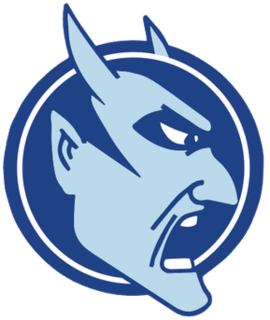
Belconnen United Football Club is an Australian semi-professional association football club based in the northern Canberra region of Belconnen, ACT. The club currently competes in the National Premier Leagues Capital Football.

APIA Leichhardt Football Club, also known simply as APIA, is a semi-professional soccer club based in the suburb of Leichhardt in Sydney, Australia. The club was formed in 1954 as APIA Leichhardt, by Italian Australians APIA, winner of the national Australian championship of 1987, is currently a member of the NPL NSW.
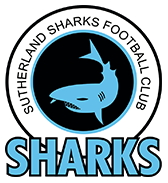
Sutherland Sharks Football Club is an Australian Association football club based in the suburb of Sutherland in Sydney New South Wales. The club currently competes in the National Premier Leagues NSW. The club's home games are played at Seymour Shaw Park, located in the southern Sydney suburb of Miranda. It recently opened a new academy. It is incorporated as a non-profit club.
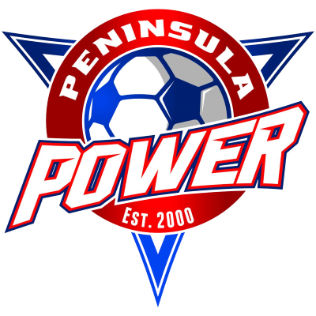
Peninsula Power is an Australian football (soccer) club from Redcliffe, Queensland. The club was formed in 2000 following a merger of the Redcliffe City and Margate soccer clubs. The club currently competes in the Brisbane Premier League. In May 2017, Football Queensland announced Peninsula Power FC were among the 14 clubs accepted to form the Football Queensland Premier League for its initial season in 2018.

Soccer in the Australian Capital Territory (ACT) is predominantly amateur with a local, interstate, national and international history. Football in the ACT is organised and administered by Capital Football and involves teams from within the ACT and surrounding NSW regions, Monaro, Southern Tablelands and Riverina.

Gold Coast Knights Soccer Club is an Australian soccer club from the city of Gold Coast, Queensland. It is a Croatian Australian backed club which was founded in 1978 and currently plays in the NPL Queensland. The club's home ground is the Croatian Sports Centre in the suburb of Carrara. Gold Coast Knights soccer club has hosted the Australian-Croatian Soccer Tournament in 1995, 2012 and 2018.
The National Premier Leagues Capital Football 1 is an soccer competition contested by clubs affiliated to Capital Football. The league is the highest level competition in the Australian Capital Territory (ACT) region. It is a subdivision of the National Premier Leagues and sits in Level 2 in the overall Australian league system.

Queanbeyan City Football Club is an Australian amateur association football club based in the NSW city of Queanbeyan, Australia. The club was founded in 1966 and currently competes in ACT competitions including the ACT Capital League.

Australian National University FC is an Australian amateur association football club representing the Australian National University based in Acton, Australian Capital Territory. Founded in 1962, the club is inclusive of both current and graduated students and currently competes in the ACT Capital League.
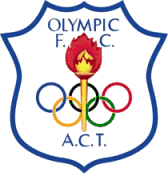
Canberra Olympic FC is an Australian semi-professional Association football club based in the suburb of O'Connor in the north of Canberra, Australian Capital Territory. The club was founded in 1956, and currently competes in the National Premier Leagues Capital Football.

Tuggeranong United FC are an association football club based in the southern Canberra region of Tuggeranong, ACT, Australia. The club competes in the highest level of football in the ACT, NPL Capital Football.
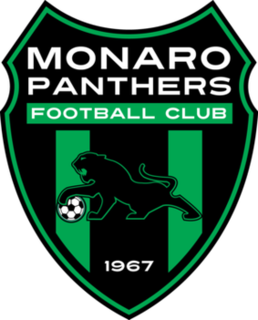
Monaro Panthers FC is an Australian association football club based in the city of Queanbeyan, New South Wales. The club was founded in 1967, and currently competes in the National Premier Leagues Capital Football in the Australian Capital Territory.

Cooma Football Club is an Australian semi-professional association football club based in Cooma, New South Wales. The club is affiliated with Capital Football and currently competes in the National Premier Leagues Capital Football in the ACT. Cooma's home venue is Nijong Oval and the Tigers are twice league champions and once league premiers.

HNK O’Connor Knights FC is an Australian semi-professional soccer club based in the northern Canberra suburb of O'Connor, Australian Capital Territory. Founded in 1997 by North Canberra’s Croatian community, the club currently competes in the ACT NPL 2. The Knights have won one Federation Cup and secured two ACT second division titles.

Deakin Stadium is an association football ground located in the south-central Canberra suburb of Deakin, ACT. It is the home ground of Canberra FC in the NPL ACT.

Narrabundah FC is an Australian community association football club based in the suburb of Narrabundah in the central-south of Canberra, Australian Capital Territory. The club was founded in 1976, and currently competes in the ACT Capital League.
St George-Souths was an Australian football (soccer) club formed in 1950 as the Hellenic Soccer Club by Brisbane’s Greek community. It was a powerhouse of Brisbane soccer in the 1960s and 1970s. The club was dissolved in 1982 with its legacy continuing at Olympic FC.
The National Premier Leagues Capital Football 2 is an association football competition contested by clubs affiliated to Capital Football. The league is the second highest level competition in the Australian Capital Territory (ACT) region. It is a subdivision of the National Premier Leagues and sits in Level 3 in the overall Australian league system. Prior to 2019, the league was known as the Capital League and was the top division of the ACT State League system.


















